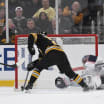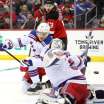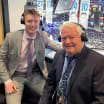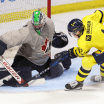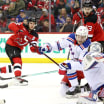"The bottom line is, it's progressing," Boyle said. "I said [on Sept. 19] that I wanted to play in the season opener, because doesn't everyone? But it's not the be-all, end-all if it didn't happen. Even if I'm cleared to practice with the team, I'm not just going to jump in. I need to get my own training here at some point and get into situations that are real instead of just skating.
"I haven't bumped or hit anyone, and that's a huge part of your conditioning, so that's still something hanging over my head so that when I come back, I want to have an impact. I'm doing everything I can now to make sure that happens, but it's going to take some time."
Boyle, whose condition is a type of cancer of the bone marrow, said the daily treatments are helping, but patience is key.
"I've been getting my blood drawn and things are getting better each time I do it," he said. "There are certain hurdles I have to go through; I have to make sure I'm ready and I don't think I can just be cleared and go out and play games. As much as I've skated on my own there hasn't been any kind of real hockey situations, and that takes some time. I really couldn't tell you when I'll be able to practice again."
Devils coach John Hynes is happy Boyle made the trip to West Point.
"He was with the guys on the hike [on Sunday] and has been at team meetings, and even in those meetings he speaks up and has great opinions," Hynes said. "I think conditioning wise, he's at a high level but then it comes down to the comfort level of battling. Hopefully we'll get really good news on [Tuesday] and we'll try and move it forward as quickly as we can."
Boyle, who signed a two-year, $5.5 million contract with the Devils as an unrestricted free agent on July 1, has been overwhelmed with all the support he and his family have received since going public.
"I've received so many calls and the Pittsburgh Penguins sent a letter signed by everyone with a note from [coach] Mike Sullivan and Sidney Crosby; it's been amazing," Boyle said. "There's a lot going on in the world now but when people are down, others are good about picking them up and it's restored a lot of my faith in humanity, for lack of a better phrase. It has motivated me to do things right to make sure I can beat this thing and get over it.
"There were days when I was as down as I've ever been, to some decent news from the doctor, to the outpouring by everyone. I feel pretty good about things."
Boyle is glad to have an opportunity to get his know his new teammates on the trip to West Point. It has also hit home for right wing Kyle Palmieri, whose sister, Taylor, has been a member of the New York National Guard the past four years. Tahrin Palmieri, the eldest of four Palmieri siblings, is married to Army Ranger Stephen Ficchi, and Palmieri's cousin-in-law, Sierra Harrelson, is a military police officer at West Point.
Devils rookie center Nico Hischier has enjoyed the time learning about the Academy. He noted the story told by Army hockey coach Brian Riley about two former students and players who were killed while on duty in Afghanistan.
"The Army coach explained the dedication by two former players who were killed in action and that was something I won't forget," Hischier said.
Riley spoke about Maj. Tom Kenney, who graduated West Point in 2000 and was killed in action in 2012, and 1st. Lt. Derek Hines, who graduated in 2003 and died two years later.
"It's easy to play with guys because when you play with someone you don't have to sacrifice anything but when you play for somebody, you might have to sacrifice something and there's a huge difference," Riley said. "That's what we learned from Kennedy and Hines."




